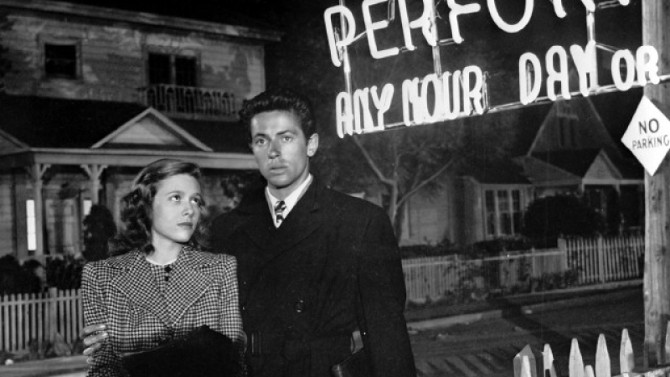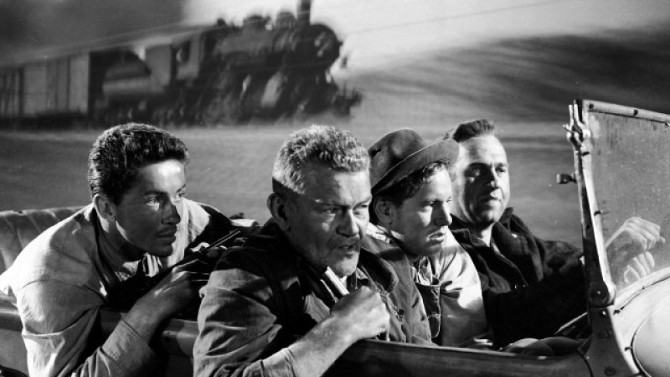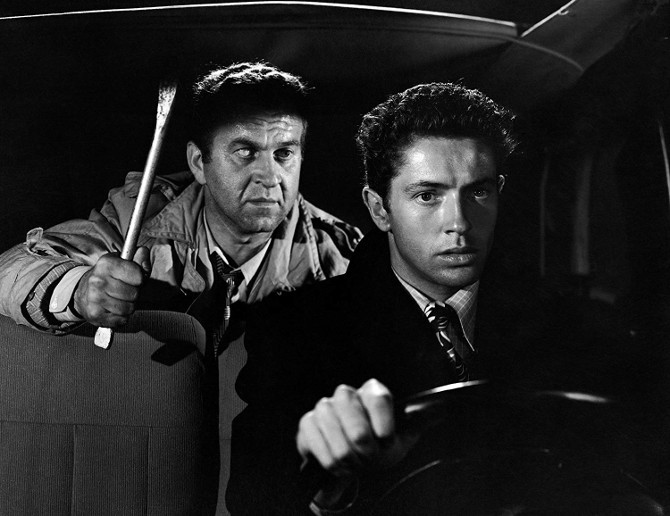Just a quick reminder that we have once again arrived at Noirvember – the month that is all things film noir. So keep an eye out for several noir reviews in the coming month.
Taking noir genre tropes and flipping them on their heads, Nicholas Ray’s They Live by Night (1948) challenges the city setting, the cynical detective, the sultry femme fatale, and at every turn, finds a clever way to surprise and intrigue.
An intimate look at the lives of outsiders (a Nicholas Ray speciality – think In a Lonely Place; Rebel Without a Cause), three individuals have escaped the confines of prison. . . guys who would easily be picked out of a lineup: one-eyed Chickamaw (Howard Da Silva) – a sinister man, quick to anger when his missing socket is mentioned; monstrous T-Dub (Jay C. Flippen) – though he seems sensible, there is a violent streak hidden just below the face only a mother could love; and baby-faced Bowie (Farley Granger) – the meek getaway driver of the gang.
Hiding out at a gas station owned by Chickamaw’s alcoholic brother Mobley (Will Wright), twenty-three year old Bowie soon spots the proprietor’s tom-boy daughter, Keechie (Cathy O’Donnell) – two youths who have never had the chance to live and love.
Bowie soon divulges to her that he was a somewhat innocent bystander of a murder (the only one not to run away after the act), and that his hope is that by robbing banks, he will be able to raise the capital to hire a lawyer so that he can fight the charge. . . T-Dub has a similar plan, hoping to get his brother released with the cash – his sister-in-law Mattie (Helen Craig) frequently shows up, desperate to get her man back.
Stuck between two very different lives, the young lovers run away (an intimate look at road life in the 1940’s). . . taking buses and soon buying a car, through their transient life we see the bustling rural world that has grown along country highways – restaurants, motels, and most importantly, a chapel (nothing like having a neon sign inviting you in to get hitched).
Getting married, for one brief instant, it seems like life may just work out. But, as they say in crime movies, ‘just when I thought I was out, they pulled me back in’, and Chickamaw soon comes knocking, another planned robbery for the twosome who have both been frivolous with their money.
Feeling like he owes the criminals something, Bowie takes a meeting with T-Dub, hoping that he will let him off of the hook now that he is a married man (the media now having spun the tale that Bowie is somehow the mastermind leader of the group – something that drives Chickamaw crazy). Will Bowie be sucked back into the world of thieving, or will he find a way to escape with his love? *Caveat* Though the premise may seem doomed, a love story lined with a destiny of pain and betrayal, there is still the hope that is young love – Ray teasing the viewer that there may be a slim chance for a future without being on the lam.
Though Ray twists the noir genre around, it still has that stylized, hard-boiled dialogue – “I was just trying to get her to take a drink, she’s so dried up”; also, there are a few comedic lines that are just classic. . . my favourite: “between him and the chicken, I’d bet on the chicken”.
Packed with style, Ray, not a classically trained director, was given more freedom on this, his first film, than any other he would make thereafter – one of the great film making debuts of all-time. Utilizing rarely used techniques seen in the 1940s, a God’s view shot from helicopter opens the film – the wind giving us the semblance that they are being swept away in a fateful tale not even they can control, while its sound design is extremely intricate – something almost unheard of at the time. Then there is a specific robbery scene, it shot from the perspective of the driver (bringing to mind the modern gem Baby Driver), a tense, suspenseful few minutes where things never seem to work out just right. And, lest we forget the cinematography, with director of photography George E. Diskant bringing that layered shadow and light to life – from the first time we see Keechie (her face mostly blacked out, symbolic of the dichotomous struggle that is her life), we know we are in for quite the chiaroscuro treat.
Finding its place somewhere between Romeo and Juliet and Bonnie and Clyde, there is a tragic quality to the romance. . . as it seems like fate has dealt these two a bad hand. For an escaped prison convict, Bowie is a sympathetic character – Ray imbuing his lead with a wrong place/wrong time streak of bad luck, a man who has no one but thieves and tricksters to trust. Brought to vivid life by Farley Granger, it is one of his best roles – a realistic, sharp, emotional turn from the actor that never truly became the star he very well could have been. Obviously, Cathy O’Donnell is equally important. . . her transformation from tom-boy to woman over the course of the narrative something to behold; together, a couple brimming with innocence, sympathy, vulnerability, and a virginal quality – so very rare for a genre oozing with cynics and sleazes.
An influential road movie, Howard Hughes, who came on as RKO studio head after the film was made, shelved it for two years (not a fan – it was only released after the film’s producer, Dore Schary, now at MGM, fearing that They Live by Night would never make it to theatres, cast Granger and O’Donnell together again in another film noir, Side Street – Hughes finally released it in order to beat the competing film’s start date), though filmmakers at the time were already admiring its impressive sound design and visual flair – later, its powerful tale of teen road love would be an important influence on films like Gun Crazy, Bonnie and Clyde, Badlands, as well as some French new wave films (think Breathless). . . really, the only film prior to this that had a somewhat similar tale is Fritz Lang’s 1937 feature You Only Live Once.
A story about people at the end of the road – no where else to go but into the dangerous unknown, They Live by Night is a dazzling romantic noir from first time director Nicholas Ray. In a movie with superb casting, the only disappointment is that Robert Mitchum desperately wanted to play Chickamaw, as, in the novel (Edward Anderson’s Thieves Like Us), the character worked on a chain gang – something the man also had to do in real life, but the studio did not want the recently Oscar nominated actor to be cast in a secondary role. So, fall for this excellent motion picture, it is a bullet-riddled love letter to the struggles of the outsider youth of society.



